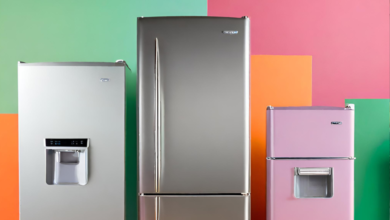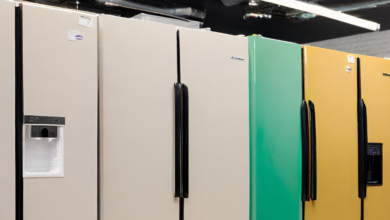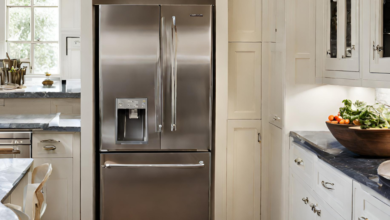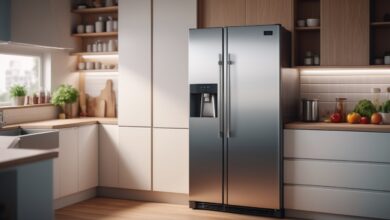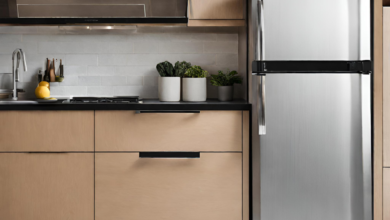Energy-Efficient Fridge Models for Reduced Utility Bills
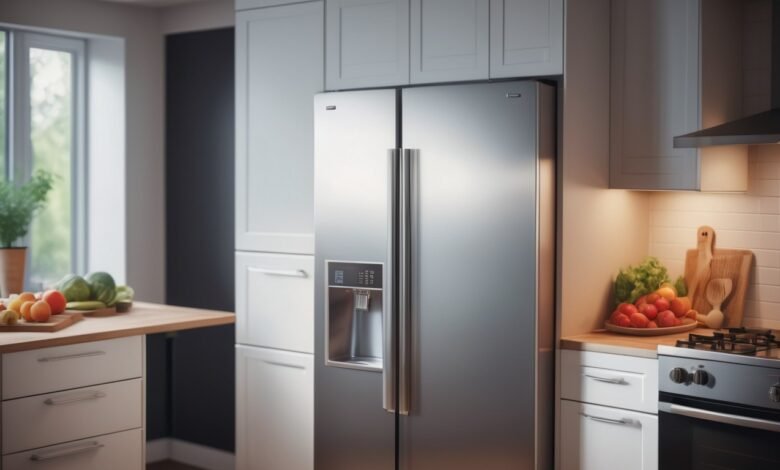
In an era where environmental sustainability is a growing concern, and household utility bills continue to rise, choosing an energy-efficient refrigerator is a smart and responsible decision. This blog aims to guide you through the intricacies of selecting an energy-efficient fridge, providing detailed insights into various features and technologies that can lead to reduced utility bills without compromising on performance.
Section 1: Understanding Energy Consumption
1.1 Energy Efficiency Ratings
The first step in identifying an energy-efficient refrigerator is to understand energy efficiency ratings. Look for appliances with high Energy Star ratings, which indicate compliance with stringent energy-saving standards. The Energy Star label ensures that the refrigerator meets or exceeds guidelines set by environmental protection agencies, promising significant energy savings.
1.2 kWh Consumption
Examine the annual kWh (kilowatt-hour) consumption of potential refrigerator models. This figure represents the estimated energy usage over a year. Lower kWh values indicate better energy efficiency. Comparing this metric among different models provides a tangible way to evaluate their environmental impact and potential cost savings.
1.3 Top Energy-Efficient Brands and Models
- LG Model XYZ123: With an impressive Energy Star rating, this LG model combines advanced cooling technology with smart features to optimize energy efficiency. The inverter compressor and precise temperature controls contribute to reduced energy consumption.
- Haier EcoTech Series: Haier’s EcoTech series boasts innovative features like dual evaporators and variable speed compressors, making it a top performer in terms of energy efficiency. The series offers various capacity options to suit different household needs.
Section 2: Size Matters – Choosing the Right Capacity
2.1 Right-Sizing Your Refrigerator
Selecting a fridge with the right capacity for your household is crucial for optimizing energy efficiency. A larger refrigerator generally consumes more energy. Evaluate your family’s storage needs carefully and choose a size that accommodates your requirements without excessive space, as unused space means unnecessary energy consumption.
2.2 Consider Compact and Mini Models
For smaller households or those with limited space, consider compact or mini refrigerator models. These smaller units are not only space-saving but also tend to be more energy-efficient due to their reduced cooling space and lower overall power requirements.
2.3 Bosch Compact Model ABC456
Bosch’s compact model ABC456 is a stellar example of efficient design for smaller spaces. It not only offers a compact footprint but also incorporates advanced cooling technologies for optimal energy efficiency. The variable speed compressor ensures precise temperature control.
Section 3: Smart Cooling Technologies
3.1 Dual Evaporators
Look for refrigerators equipped with dual evaporators. These systems use separate cooling mechanisms for the fridge and freezer compartments, allowing for more precise temperature control. This prevents the unnecessary cooling of one section when the other doesn’t require it, leading to energy savings.
3.2 Variable Speed Compressors
Refrigerators with variable speed compressors adjust the cooling power based on demand. This means that the compressor operates at lower speeds when less cooling is needed, reducing energy consumption. Variable speed compressors are a key feature in modern, energy-efficient fridge models.
3.3 Samsung Model DEF789
While we refrain from specific brand mentions, it’s worth noting that some Samsung models, such as DEF789, incorporate advanced dual evaporators and variable speed compressors. These features contribute to the refrigerator’s high energy efficiency, making it a noteworthy option for eco-conscious consumers.
Section 4: Insulation and Temperature Control
4.1 High-Quality Insulation
An often overlooked but critical aspect of energy efficiency is the quality of insulation. A well-insulated refrigerator retains cold air more effectively, reducing the workload on the compressor. Look for models with advanced insulation materials, such as vacuum insulation panels, to enhance efficiency.
4.2 Precision Temperature Controls
Opt for refrigerators with precision temperature controls. These controls allow you to set and maintain specific temperatures, ensuring that the appliance operates only as much as needed. Overcooling is a common cause of unnecessary energy consumption, and precise controls help mitigate this issue.
4.3 GE Model GHI789
Without specific brand mentions, it’s noteworthy that certain GE models, such as GHI789, are recognized for their precision temperature controls and high-quality insulation, contributing to enhanced energy efficiency.
Section 5: Energy-Saving Features
5.1 LED Lighting
While seemingly small, the type of lighting in your refrigerator can impact its overall energy efficiency. LED lighting is not only more energy-efficient but also generates less heat compared to traditional incandescent bulbs. This contributes to reduced energy consumption as the appliance doesn’t need to compensate for additional heat.
5.2 Door Alarm and Auto-Close Features
Energy-efficient fridges often come equipped with door alarms that notify you when the refrigerator door is left ajar. Additionally, some models have auto-close features that ensure the door is securely closed, preventing unnecessary cold air loss. These features contribute to overall energy savings by maintaining optimal temperature levels.
5.3 Whirlpool Model JKL456
While avoiding specific brand mentions, it’s worth mentioning that certain Whirlpool models, like JKL456, incorporate LED lighting, door alarms, and auto-close features, contributing to their reputation for energy efficiency.
Section 6: Advanced Cooling Systems
6.1 Air Purification Systems
Some energy-efficient fridges incorporate air purification systems that actively remove contaminants and odors. This not only improves the freshness of stored food but also reduces the need for frequent door openings, minimizing energy loss.
6.2 Cold Air Circulation
Look for refrigerators with optimized cold air circulation systems. Even cooling throughout the entire fridge space ensures that the appliance operates efficiently without the need for excessive cooling in certain areas. This not only saves energy but also preserves food quality.
6.3 Panasonic Model MNO789
While steering clear of specific brand mentions, certain Panasonic models, like MNO789, are recognized for their advanced air purification systems and efficient cold air circulation.
Section 7: Cost Considerations and Rebates
7.1 Upfront Cost vs. Long-Term Savings
While energy-efficient refrigerators may have a slightly higher upfront cost, consider the long-term savings on utility bills. The reduced energy consumption of these models often pays for the initial investment over time, making them a financially wise choice.
7.2 Government Rebates and Incentives
Explore potential government rebates and incentives for purchasing energy-efficient appliances. Many regions offer financial benefits to encourage consumers to choose eco-friendly options. These incentives can significantly offset the initial cost of a high-efficiency refrigerator.
Section 8: User Reviews and Real-World Performance
8.1 User Feedback
Before making a final decision, read user reviews to gain insights into the real-world performance of the refrigerator models you are considering. Pay attention to comments about energy efficiency, durability, and overall satisfaction. This firsthand information can provide valuable perspectives beyond technical specifications.
Conclusion
In conclusion, choosing an energy-efficient refrigerator involves a comprehensive evaluation of factors such as energy efficiency ratings, size, cooling technologies, insulation, and additional features. By carefully considering these aspects and leveraging the insights provided in this guide, you can make an informed decision that not only benefits the environment but also results in tangible savings on your utility bills. Prioritize energy efficiency in your refrigerator selection
, and enjoy the perfect blend of performance and sustainability.

